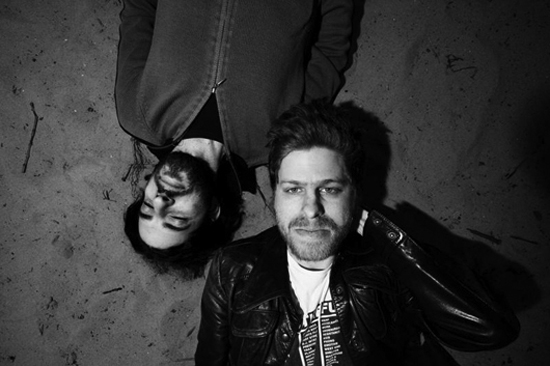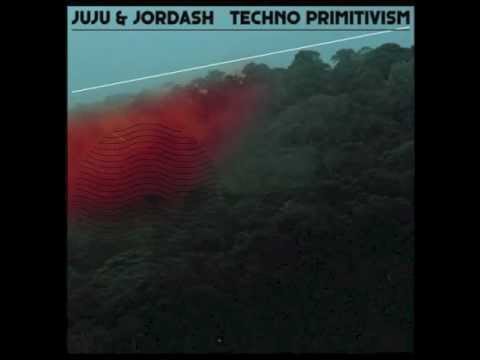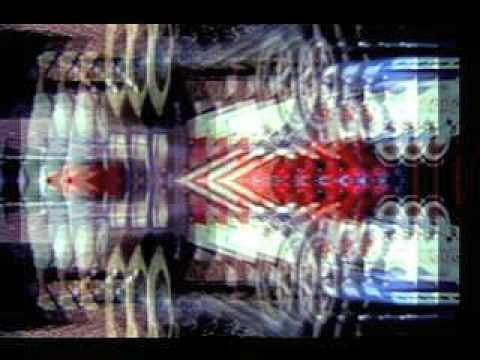"We trust our jams," declares Jordan Czamanski, one half of Israel-born, Amsterdam-based duo Juju & Jordash. "We trust that something interesting will come out of them, so that frees us from thinking too much." Together, he and Gal Aner produce a sublime, humorous and deeply idiosyncratic form of analogue electronic psychedelia. Born of extended sessions of studio improvisation, it plays like a comprehensive exploration of the contents of the duo’s own minds. Anchored largely by a four-to-the-floor rhythmic pulse that ties its contents – however loosely – to house and techno, that grounding gives them free rein to blast off into all manner of other spaces, taking in drone, dub, krautrock, funk and jazz along the way. The latter especially is a cornerstone: their best tracks explore a similar tension between careful control and wild, explosive energy, suggesting that the duo have become very adept at responding to one another’s impulses in real-time.
"I think it’s more knowing each other’s sensibilities," says Czamanski. "Knowing that I can play some crazy shit and Gal will back it up, and not clash into it."
"It’s about leaving space for each other to go nuts," agrees Aner, "but without completely doing amorphous stuff. Which can also be fun, but it’s nice if at least one of us keeps a connection to reality."
That said, last year’s sprawling triple-LP Techno Primitivism might possess many traits, but a concrete grounding in the real world certainly isn’t one of them. Shrouded in a druggy haze of delay, surface noise and oddball humour, its tracks are liable to head off on all manner of unexpected tangents: witness opener ‘Stoplight Loosejaw’, where dense surface fog repeatedly shifts to allow new motifs to snake to the surface, like torch beams illuminating tiny sections of a colossal, darkened hall. ‘Powwow’ starts off as a relatively straightforward Chicago-leaning house track – streamlined, aimed right at the jugular – before it’s abruptly thrown off balance by a series of bulbous bass notes that descend in steps, like a beach ball bouncing down a flight of stairs. Elsewhere they stop by distorted kosmische sketches and dissonant scrawls of piano (‘Diatoms’), burbling jazz-funk (‘Shakshuka Dub’) and Workshop-style throbbing slo-mo house (the wonderfully titled ‘Dr Strangepork’).
Techno Primitivism‘s contents emerged relatively fully formed from a series of studio jam sessions – "as many as we could [manage] in three months," says Czamanski, "which is a lot" – which makes its innate grasp of space, shape and dynamics all the more impressive. Still more enjoyable is their willingness to repeatedly destabilise any momentum they’ve built up. Straightforward club tracks are refreshingly rare in the duo’s back catalogue, and the concessions they do make to full-blown dancefloor mode are equally unconventional: 2009’s marvelous ‘Deep Blue Meanies’, which climaxes with a teasing period of beatlessness, or last year’s towering, Italo-disco leaning ‘Jewsex’. Techno Primitivism, meanwhile, closes with a run of gorgeous, gauzy deep house tracks, drowning their drum machine rhythms in stormy squalls of synth.
‘Stoplight Loosejaw’, taken from the Techno Primitivism album
This tension – an ongoing tug-of-war between dance music’s structural conventions and an intrinsic desire to push those restrictions to their limit – is hardwired into their music. It’s informed by, and in turn influences, their live performances, which are generally tailored more specifically to the demands of a club crowd. Over the past few years, they reveal, their sets have moved from being partially planned to fully improvised. This opens up the possibility, admits Aner, that things could simply fall apart, or that any momentum they’ve acquired could dissipate with one misstep – but, he says, that’s part of the fun. "You’re recreating something that’s more organic to the situation, you’re reacting to [the crowd] in the moment you’re in now. And also the crowd likes those kind of searching moments, because you can hear that tension."
Unsurprisingly, given how comfortable they are with allowing their music to find its own path in real-time, jazz is the chief ingredient stirred into Juju & Jordash’s cocktail of influences. Growing up in Haifa, Israel, both first came across jazz while still teenagers: Jordan when given a Django Reinhardt record for his bar mitzvah ("I kept it, but at first I was very disappointed because at the time I was listening to Slayer and Iron Maiden") and Gal through discovering "hard bop, late 50s jazz and bebop" via his guitar teacher. "I got into free jazz maybe a year or two later when a friend of my dad’s gave me an Albert Ayler CD, because he thought it was broken," he laughs. "It was the weirdest thing I’d heard up to that point and I thought it was really cool. I didn’t understand what was going on, but I knew it was interesting. And then I started to explore this kind of style as well."
The duo first met through jazz, too, while playing together in jam sessions with friends in the mid ’90s. They found that they were well suited to playing with one another, and continued to work together regularly as the project crystallised into something more concrete. "We both kind of know how to shut up when we play, and listen, we’re not super technocratic about it. So I think that was one thing that that kind of bonded the whole thing," says Gal.
"We’re both not very good technically, is what he means," laughs Jordan. "[It’s about] aspects of freedom, and willingness to lose form, and explore. I don’t have any jazz training proper, and so for me, I’ve never been a form Nazi in jazz – it’s been difficult for me to keep form many times. I guess Gal is open minded enough to go there."
‘Deep Blue Meanies’, taken from their self-titled debut album
Their pathway through to electronic music was similarly instinctive. Czamanski had first become interested in dance music while in the army. "Up until then I was into industrial – Throbbing Gristle, Skinny Puppy, things like that – and then in my first week in the army I met a DJ who introduced me to the world of Detroit techno. From there on it merged perfectly my love of industrial stuff and my love of modal jazz." Over their years of working together they gradually adapted to making music using a growing arsenal of hardware and instruments – synths, drum machines, effects, guitar – and began to take advantage of the new opportunities those technologies presented. "I think it’s a more hands-on kind of approach towards making music," says Aner. "When you play in a jazz quintet or something, you are more dependent on more musicians, [and] rehearsals, and it’s a bit more complicated in a way to put your ideas straight on tape."
The duo moved to Amsterdam from Tel Aviv around the middle of last decade, allowing them to connect directly to the city’s fertile house and techno scene. Although they operate very much in self-generated space, Juju & Jordash’s fluid attitude towards club music – and the heavy-lidded, distinctly psychedelic sound of their records – has brought them into orbit with a number of other contemporaries exploring similar areas. A series of releases through the Dekmantel label have connected them with kindred spirits like Morphosis (who turned in a gorgeous, churning remix of the duo’s ‘Quasi Quasi’ for their 2010 EP of the same name) and Vakula, and their hardware-and-improvisation based approach is equally in-line with exploratory artists further afield, including the likes of Hieroglyphic Being and Metasplice.
Locking into a global house scene also connected them directly to deep house veteran David Moufang, aka Move D, with whom Aner and Czamanski now regularly make music as a collaborative trio named Magic Mountain High. Beginning as a series of studio jams in very much the same vein as the duo’s own work, it gradually found its way into the live setting. The approach, says Jordan, is "more delicate. When we’re [performing] with David it’s an extra person, so it takes the load off [each individual player]. We can spend more time and be a bit more intricate." Last year’s Schnitzel Box Vol. 1 12" was their first outing on wax, and found them pinpointing a sound closer to Juju & Jordash than Moufang’s slightly more classicist deep house constructions: three supremely rubbery techno tracks, all contorting analogue basslines and crisp percussion.
‘Coffin Train, taken from the Unleash The Golem Part 2 EP
Aner and Czamanski’s music for Dekmantel leans towards the more playful side of their oeuvre. By contrast their recent work for US label Golf Channel, a series of 12"s under the heading of Unleash The Golem, is tense and provocative. The golem is a creature from Jewish folklore, crafted from clay and brought to life to keep its makers safe, but which inevitably turns on the very people it was created to protect. This series uses it as a thematic parallel to bring into question some of the more thorny issues surrounding the modern day state of Israel, including whether or not its relationship with Palestine and the rest of the world might eventually prove to be its undoing. "Is Israel a modern golem, created to protect the Jews but left to run amok? Is it an experiment bound for destruction?" reads Golf Channel’s press release accompanying the first volume of the series. "Inspiration comes from years wrestling with thoughts of Zionism, victimhood and vengeance. And who said dance music couldn’t be about the Holocaust?"
In previous interviews Czamanski and Aner have appeared somewhat reticent to speak directly about Unleash The Golem‘s subject matter, suggesting that it functions as more a personal project – a way of exploring and addressing issues that are, naturally, very close to home – than an attempt to make a strong sociopolitical statement. However, the oppressive chug of the music and track titles like ‘Chelm Is Burning’ – which refers to a city in Poland whose Jewish population was almost entirely murdered during the Holocaust – hit home with undeniable force, especially when compared to much of their earlier music. "I think it’s the same, though," muses Czamanski. "All politics are personal, they boil down to personal psychological motivations and ideas that come from emotional states. So at least for me, it kind of goes hand in hand. It’s very personal things that are related to that, and the political part of it just comes naturally out of that, I guess."
The Golem project originally came about after the duo were commissioned, in 2010, to soundtrack Paul Wegener and Henrik Galeen’s 1915 silent horror film Der Golem. They had no real prior experience of soundtracking films – except "a couple of student projects, 15 or 20 years ago," says Czamanski – so working on the score proved a refreshing experience. "The original score wasn’t dark at all," says Czamanski. "It was all orchestral, a really happy, slapsticky sounding score." For their version, they opted to make the music reflect the film’s atmosphere and subject matter more accurately: "Super dark." The commission was originally a standalone performance for a Jewish film festival in Amsterdam, but it generated so many ideas that the duo decided to flesh it out into a series of four EPs and a DVD.
The music on the two Unleash The Golem 12"s to date is Juju & Jordash’s best and most ambitious to date. Dark, sludgy, oppressive and propulsive, ‘Chelm Is Burning’s motorik throb unfolds across sixteen minutes, beneath greyscale synths that billow across its surface like smoke pouring from a burning building. ‘Coffin Train’, from the newly-released Volume 2, is starker still, its twenty-two minutes all acidic burbles of bass and the raw screech of wheel upon rail. It doesn’t require too much of a stretch to imagine what particular railway they might be referring to in its title; but as with all the duo’s work there’s a level of ambiguity in its presentation, and on the flipside alternative version ‘Coffin Train Getaway’ is tooled explicitly for the dancefloor, a world away from its companion piece. As a result, the Golem 12"s succeed in feeling more like meditations on a series of themes than prescriptive statements aimed at evoking a particular emotional response. "It’s not like we have all the answers," agrees Aner.
"[These are] complicated psychological constructs and political issues that we don’t have [definite answers for]," continues Czamanski. "[But] there is something that is difficult for us to reconcile. A few people have said that it hit home," he continues. "Israelis, all of them. So I guess we are expressing something that resonates for some Israeli Jews who can relate to the atmosphere – the quandaries."
Future instalments of the Golem series are set to bring the duo full circle back towards live ensemble work – they plan to work with a live instrumentation for the subsequent volumes, bringing in saxophone, drums and possibly other instruments too. It’s something they’ve done before, reveals Aner. "We wrote scores for horn players, let them play it and then we worked around that," he says of some of their earlier work. "Or ‘African Flower’ which was based on an existing chord progression from Duke Ellington. So we have those sorts of tracks as well."
The freedoms afforded by their flexible approach continue to offer these kind of options, agrees Czamanski, and they remain open pathways for the future, allowing this most eccentric of dance music duos to blast further off into self-defined space."It’s as if it’s our own little world. If we want to work with other musicians we can bring them in and record them, but we don’t work as a band in a rock or jazz band sense. And we always talk about – and we do it to some extent, going beyond an electronic dance music kind of framework and making an all acoustic album."
Magic Mountain High play live and Juju & Jordash will be DJing at the ReviveHER x Phonica party at London’s Corsica Studios this Saturday, 9th March. For more information and tickets, click here. Techno Primitivism is out now on Dekmantel. Unleash The Golem Part 2 will be released in the near future via Golf Channel Recordings.




